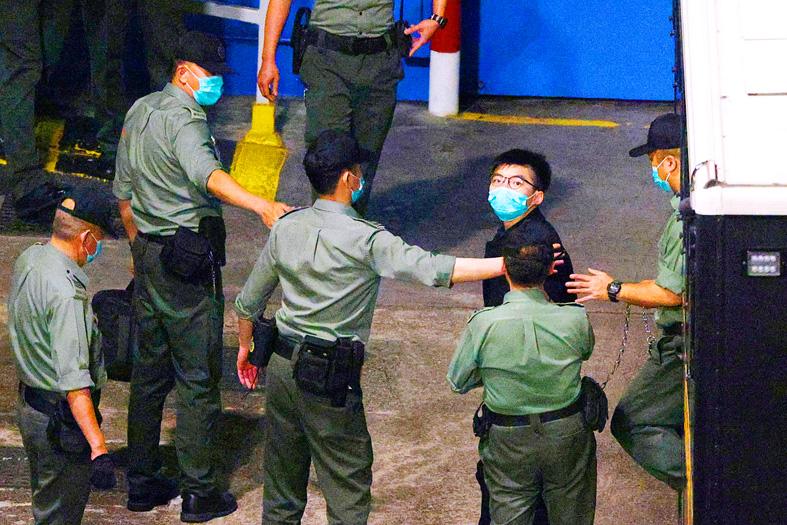Dozens of Hong Kong democracy advocates charged with subversion yesterday returned to court to complete a marathon bail hearing that was adjourned overnight when four defendants were rushed to hospital after hours of legal wrangling.
Police on Sunday arrested 47 of the territory’s best-known dissidents for “conspiracy to commit subversion” in the broadest use yet of a sweeping National Security Law that Beijing imposed on the territory last year.
The defendants represent a broad cross-section of Hong Kong’s opposition, from veteran former pro-democracy lawmakers to academics, lawyers, social workers and youth advocates.

Photo: Reuters
Hundreds of supporters gathered outside a courthouse on Monday for the first post-charge bail hearing, chanting democracy slogans — a rare resurgence of defiance in a territory where protest has been all but outlawed over the past year.
Normally such a bail hearing might take little more than a couple of hours.
However, the court struggled to deal with the sheer caseload as well as the legal vagaries of the broadly worded security law, which removes the presumption of bail for non-violent crimes.
The court sat on and off for about 15 hours throughout Monday as the prosecution called for the advocates to be held in custody until the next hearing in three months’ time while the defense tried to pursue bail.
An adjournment only came in the early hours of yesterday morning after one of the defendants, Clarisse Yeung (楊雪盈), collapsed and was rushed to hospital.
Three other defendants were subsequently taken to hospital in ambulances. At the time of the adjournment, less than half of the bail hearings for the 47 defendants had been heard, a reporter in court said.
The defendants were then taken in handcuffs to a nearby detention center for a few hours’ sleep before returning to court yesterday morning.
Yeung said on Facebook that she fainted after receiving no food for 12 hours and was being treated in hospital for low blood pressure.
The three others who fell ill were also not in court.
Beijing is struggling to quash dissent in semi-autonomous Hong Kong after huge pro-democracy demonstrations in 2019.
The security law has been the spearhead of that crackdown, criminalizing any act considered to be subversion, secession, terrorism or collusion with foreign forces.
It has radically transformed Hong Kong’s relationship with the authoritarian mainland and outlawed dissent in the once free-wheeling territory.
One major area of change is bail.
Under the new law, defendants may only be granted bail if they can persuade a court they no longer pose any kind of national security risk.
Before Monday’s hearing, all those charged with a national security crime had been held on remand, despite agreeing to restrictive measures such as house arrest and making no public statements.
The alleged offense for the 47 facing subversion charges was organizing an unofficial primary election last summer to choose candidates for the territory’s legislature, in the hopes that the pro-democracy bloc might take a majority and stymie government legislation.

Kehinde Sanni spends his days smoothing out dents and repainting scratched bumpers in a modest autobody shop in Lagos. He has never left Nigeria, yet he speaks glowingly of Burkina Faso military leader Ibrahim Traore. “Nigeria needs someone like Ibrahim Traore of Burkina Faso. He is doing well for his country,” Sanni said. His admiration is shaped by a steady stream of viral videos, memes and social media posts — many misleading or outright false — portraying Traore as a fearless reformer who defied Western powers and reclaimed his country’s dignity. The Burkinabe strongman swept into power following a coup in September 2022

‘FRAGMENTING’: British politics have for a long time been dominated by the Labor Party and the Tories, but polls suggest that Reform now poses a significant challenge Hard-right upstarts Reform UK snatched a parliamentary seat from British Prime Minister Keir Starmer’s Labor Party yesterday in local elections that dealt a blow to the UK’s two establishment parties. Reform, led by anti-immigrant firebrand Nigel Farage, won the by-election in Runcorn and Helsby in northwest England by just six votes, as it picked up gains in other localities, including one mayoralty. The group’s strong showing continues momentum it built up at last year’s general election and appears to confirm a trend that the UK is entering an era of multi-party politics. “For the movement, for the party it’s a very, very big

ENTERTAINMENT: Rio officials have a history of organizing massive concerts on Copacabana Beach, with Madonna’s show drawing about 1.6 million fans last year Lady Gaga on Saturday night gave a free concert in front of 2 million fans who poured onto Copacabana Beach in Rio de Janeiro for the biggest show of her career. “Tonight, we’re making history... Thank you for making history with me,” Lady Gaga told a screaming crowd. The Mother Monster, as she is known, started the show at about 10:10pm local time with her 2011 song Bloody Mary. Cries of joy rose from the tightly packed fans who sang and danced shoulder-to-shoulder on the vast stretch of sand. Concert organizers said 2.1 million people attended the show. Lady Gaga

SUPPORT: The Australian prime minister promised to back Kyiv against Russia’s invasion, saying: ‘That’s my government’s position. It was yesterday. It still is’ Left-leaning Australian Prime Minister Anthony Albanese yesterday basked in his landslide election win, promising a “disciplined, orderly” government to confront cost-of-living pain and tariff turmoil. People clapped as the 62-year-old and his fiancee, Jodie Haydon, who visited his old inner Sydney haunt, Cafe Italia, surrounded by a crowd of jostling photographers and journalists. Albanese’s Labor Party is on course to win at least 83 seats in the 150-member parliament, partial results showed. Opposition leader Peter Dutton’s conservative Liberal-National coalition had just 38 seats, and other parties 12. Another 17 seats were still in doubt. “We will be a disciplined, orderly